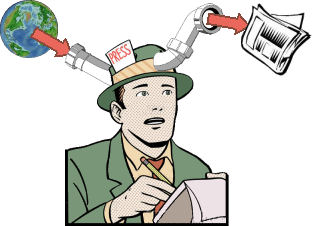How (Not) To Tell Someone Something
Saturday, January 20, 2007 → by Robokku
(... or 'A Small Problem With a Short Answer to a Small Problem With Objective Journalism')

The Journalist wants to communicate to his readers some facts. He does not want to taint the reality of what he describes with the personality of his description. Can he do it? Maybe not. He's just a guy after all. His interpretation of things has to get in there somewhere, or else he has only the nonsense we actually see. So how can he transport to us the very stimuli he has to himself? Easy: he must try to remove himself from the prose and leave us only the raw information. We will interpret it ourselves, just as if we were experiencing it directly.
But that won't work. Not perfectly. Of course it won't. If he's worth his pulp, the world has to pass through that journalist's mind before it hits the paper. And so it will be skewed.
 So how on Earth do I learn about things from the newspapers? Well, that's a simple question, too. I know that what I read in The Sun (sometimes I read The Sun) is the truth subjected to a particular transformation. I know their tone, I know their style, I know the horrifying frequency with which they dumb the stories down so low you have to dig. So I take the reports with the appropriate portion of salt. I do dig. I think that I know that staunch emblem of our country well enough to estimate just what actually happened to provoke them to write what they wrote. It's my knowledge of their unique brand of subjectivity which takes me towards the truth.
So how on Earth do I learn about things from the newspapers? Well, that's a simple question, too. I know that what I read in The Sun (sometimes I read The Sun) is the truth subjected to a particular transformation. I know their tone, I know their style, I know the horrifying frequency with which they dumb the stories down so low you have to dig. So I take the reports with the appropriate portion of salt. I do dig. I think that I know that staunch emblem of our country well enough to estimate just what actually happened to provoke them to write what they wrote. It's my knowledge of their unique brand of subjectivity which takes me towards the truth.
So there we have the first simple problem for Ed, and the first short answer. If he wants to be objective then he might just be better off spinning issues as he fancies. I know how he works so I'll take that into account. If Rebekah Wade suddenly told me the truth, I'd assume that the truth was five times more left-wing, eight times more middle-class, and two-hundred times more complicated than it really was. She'd have misled me grossly.
And this is how we communicate, I suppose. If you know me then you know how I understand things I perceive and you know how I represent things I understand and, once you reverse those operations, you find that I have indeed taken to you the very things which confronted me. That's the short answer to the problem: if objectivity is doomed, make sure your audience knows you. Make your personality clear - certainly, don't try to eradicate it.
A friend is studying international journalism and brought me his assignment about objectivity in the press. I had that problem with it, and that answer too, and I was quite pleased that I could do his degree off the top of my head. But of course it took someone comfortingly wacky to show me how things really go.
 Dr Hunter Thompson. He paid good money for that title, so we should respect it. His reports in Rolling Stone of the 1972 US presidential election campaigns came nowhere near the problem I have imagined. He wasn't falling short of objectivity; he was aiming away from it. This was a man with no intention to tell anyone about genuine events - the kind that actually occur. He gave us a very unflattering caricature of real things and mixed it up with some shameless fabrications.
Dr Hunter Thompson. He paid good money for that title, so we should respect it. His reports in Rolling Stone of the 1972 US presidential election campaigns came nowhere near the problem I have imagined. He wasn't falling short of objectivity; he was aiming away from it. This was a man with no intention to tell anyone about genuine events - the kind that actually occur. He gave us a very unflattering caricature of real things and mixed it up with some shameless fabrications.
So did he tell me anything? If I knew more about him, maybe I could pick something up. The situation he describes is an incomprehensible mess. Did I learn that the 1972 campaigns were such a tangle that they couldn't pass through the brain of a wild, drug-fueled maniac and emerge as a coherent whole? Is that informative?
And there's the next small problem. If the traces of the reporter contaminating the basis of a story need to be discounted, we need to know the reporter well enough pick up his tracks. The author must be transparent - honest, that is, not see-through. If he's taking some liberties - even if he's lying outright - that's fine. But if no-one knows what he's doing then they don't know what he's doing it to. It's just a story.
If you're interested in Hunter S. Thompson's Fear and Loathing on the Campaign Trail '72 - and I strongly recommend it - it's in all good book-shops, filed under 'fiction'.

The Journalist wants to communicate to his readers some facts. He does not want to taint the reality of what he describes with the personality of his description. Can he do it? Maybe not. He's just a guy after all. His interpretation of things has to get in there somewhere, or else he has only the nonsense we actually see. So how can he transport to us the very stimuli he has to himself? Easy: he must try to remove himself from the prose and leave us only the raw information. We will interpret it ourselves, just as if we were experiencing it directly.
But that won't work. Not perfectly. Of course it won't. If he's worth his pulp, the world has to pass through that journalist's mind before it hits the paper. And so it will be skewed.
 So how on Earth do I learn about things from the newspapers? Well, that's a simple question, too. I know that what I read in The Sun (sometimes I read The Sun) is the truth subjected to a particular transformation. I know their tone, I know their style, I know the horrifying frequency with which they dumb the stories down so low you have to dig. So I take the reports with the appropriate portion of salt. I do dig. I think that I know that staunch emblem of our country well enough to estimate just what actually happened to provoke them to write what they wrote. It's my knowledge of their unique brand of subjectivity which takes me towards the truth.
So how on Earth do I learn about things from the newspapers? Well, that's a simple question, too. I know that what I read in The Sun (sometimes I read The Sun) is the truth subjected to a particular transformation. I know their tone, I know their style, I know the horrifying frequency with which they dumb the stories down so low you have to dig. So I take the reports with the appropriate portion of salt. I do dig. I think that I know that staunch emblem of our country well enough to estimate just what actually happened to provoke them to write what they wrote. It's my knowledge of their unique brand of subjectivity which takes me towards the truth.So there we have the first simple problem for Ed, and the first short answer. If he wants to be objective then he might just be better off spinning issues as he fancies. I know how he works so I'll take that into account. If Rebekah Wade suddenly told me the truth, I'd assume that the truth was five times more left-wing, eight times more middle-class, and two-hundred times more complicated than it really was. She'd have misled me grossly.
And this is how we communicate, I suppose. If you know me then you know how I understand things I perceive and you know how I represent things I understand and, once you reverse those operations, you find that I have indeed taken to you the very things which confronted me. That's the short answer to the problem: if objectivity is doomed, make sure your audience knows you. Make your personality clear - certainly, don't try to eradicate it.
A friend is studying international journalism and brought me his assignment about objectivity in the press. I had that problem with it, and that answer too, and I was quite pleased that I could do his degree off the top of my head. But of course it took someone comfortingly wacky to show me how things really go.
 Dr Hunter Thompson. He paid good money for that title, so we should respect it. His reports in Rolling Stone of the 1972 US presidential election campaigns came nowhere near the problem I have imagined. He wasn't falling short of objectivity; he was aiming away from it. This was a man with no intention to tell anyone about genuine events - the kind that actually occur. He gave us a very unflattering caricature of real things and mixed it up with some shameless fabrications.
Dr Hunter Thompson. He paid good money for that title, so we should respect it. His reports in Rolling Stone of the 1972 US presidential election campaigns came nowhere near the problem I have imagined. He wasn't falling short of objectivity; he was aiming away from it. This was a man with no intention to tell anyone about genuine events - the kind that actually occur. He gave us a very unflattering caricature of real things and mixed it up with some shameless fabrications.So did he tell me anything? If I knew more about him, maybe I could pick something up. The situation he describes is an incomprehensible mess. Did I learn that the 1972 campaigns were such a tangle that they couldn't pass through the brain of a wild, drug-fueled maniac and emerge as a coherent whole? Is that informative?
And there's the next small problem. If the traces of the reporter contaminating the basis of a story need to be discounted, we need to know the reporter well enough pick up his tracks. The author must be transparent - honest, that is, not see-through. If he's taking some liberties - even if he's lying outright - that's fine. But if no-one knows what he's doing then they don't know what he's doing it to. It's just a story.
If you're interested in Hunter S. Thompson's Fear and Loathing on the Campaign Trail '72 - and I strongly recommend it - it's in all good book-shops, filed under 'fiction'.
Categories: Weird, Culture, Perception, Ideas, Humour, News, Reality, Human
|
|

 Links
Links Subscribe via RSS!
Subscribe via RSS!


 Via Email
Via Email


Post a Comment